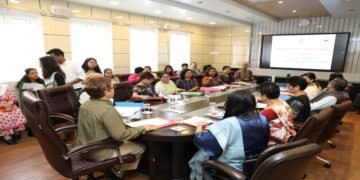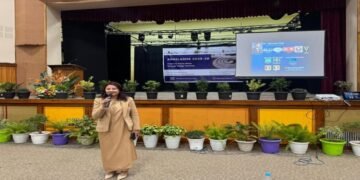New Delhi , July 17 : A survey of 24,000 girls reveals financial hardship caused by the pandemic as the greatest obstacle to a girl not returning to school as families prioritize early marriage and child labor over education.
In one of the largest surveys on girls’ education during the COVID-19 pandemic, global education nonprofit Room to Read’s Girls’ Education Risk Indicator has found 1 in 2 girls surveyed (49%) in low-income communities is at risk of their education ending permanently.
The girls surveyed are classed as at risk based on their responses to the three risk indicator questions , Are you currently self-studying/keeping up with academic learning at home?; Has anyone in your household lost a job or a source of income as a result of COVID-19?; Are you concerned about being able to return to school once schools reopen?
In April and May, Room to Read surveyed 24,000 girls in low-income communities across eight countries: India, Bangladesh, Nepal, Sri Lanka, Vietnam, Laos, Cambodia and Tanzania.
The results state that 42% of girls said their household had lost income during the pandemic, indicating the financial impact of COVID-19 is the most significant obstacle to a girl’s continued education. Families in these communities can earn less than a dollar a day, so any cut in income tends to have a major impact.
Furthermore, 8% of girls said they had stopped learning since school closures and 7% are already concerned they will not return to school. The Girls’ Education Risk Indicator plans to track these vital numbers to assess long-term impacts on gender equality in education.
Extreme economic hardship and gender disparities in low-income communities across Africa and Asia regularly result in parents choosing not to educate their daughters, according to Room to Read. The organization notes that the COVID-19 pandemic has resulted in a heightened risk to girls’ education as early marriage, gender-based violence, sex trafficking, and other pressures to contribute to family income or serve as caregivers inside the home disproportionately impact young women,
Heather Simpson, Chief Program Officer at Room to Read, commented on the Girls’ Education Risk Indicator findings:““Financial hardship has long been the number-one cause of girls not receiving an education, that is why the economic impacts of COVID-19 can be so detrimental for gender equality in low-income communities.
‘We refuse to give up on girls in some of the poorest parts of the world who dream of making a better life for themselves and their communities through the power of education.
The global community has made great strides forward in supporting girls in low-income communities, yet our progress toward gender equality could be setback decades by this pandemic.
“Our teams are working tirelessly in communities around the world to keep girls in our programs safe and educated during these difficult times, yet even with a number of successes, we have heard that some girls have already married early. Financial hardship is the main cause of families choosing to marry their daughters early, so these results must serve as a warning signal to the international community that urgent action is required.”
Room to Read has been at the forefront of ensuring education endures for girls in low-income communities across Africa and Asia. The nonprofit has been holding remote mentoring sessions with girls to keep them safe and educated during school closures, with Room to Read mentors sending 223,690 direct messages to girls in addition to 34,240 hours of remote mentoring sessions.








































